
SEBI: The Watchdog of Indian Securities Market?
Explore the comprehensive guide to SEBI (Securities and Exchange Board of India), India's market regulator. Learn about its origins, functions, powers, regulations, and role in ensuring transparency and investor protection in the financial markets.
A LEARNINGSTOCK MARKETINDIA/BHARATSTOCK OPERATORBANKING/CASH-FLOW
Sachin K Chaurasiya
11/24/20247 min read
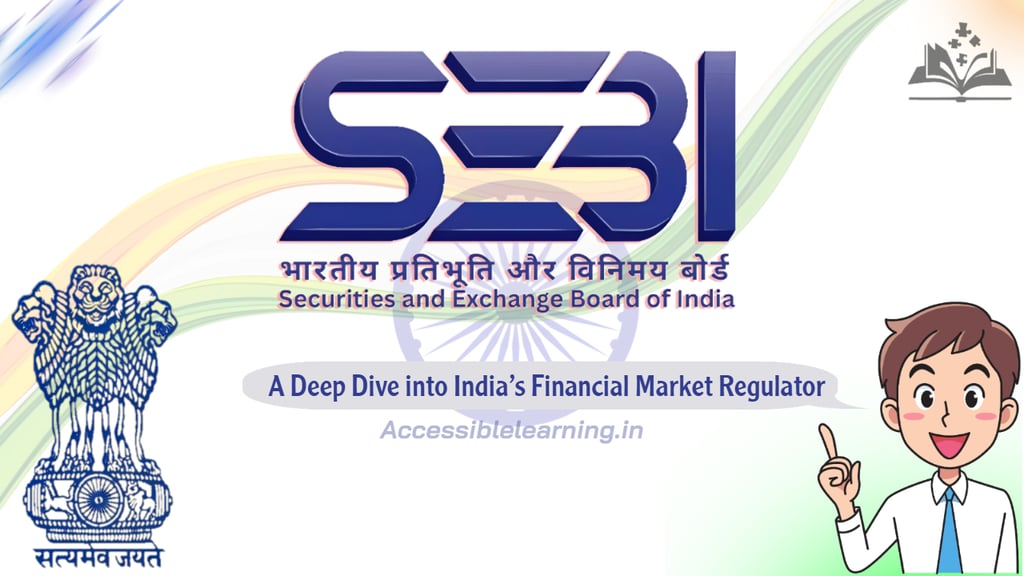

The Securities and Exchange Board of India (SEBI) is the apex regulatory body overseeing India's securities and capital markets. Established to protect investors, promote transparency, and ensure orderly market functioning, SEBI plays a critical role in maintaining the integrity of the Indian financial ecosystem. This guide dives deep into its origins, functions, regulations, and overall significance.
What is SEBI?
SEBI is the statutory regulatory authority for India’s capital markets, including stock exchanges, mutual funds, brokers, and other financial intermediaries. It ensures fair practices and protects investors from fraudulent activities.
Headquarters & Structure!
Headquarters: Mumbai, Maharashtra
Regional Offices: Kolkata, Chennai, Ahmedabad, and New Delhi, with several local offices.
Structure: SEBI is headed by a chairman, appointed by the central government, and includes members from finance, law, and securities market backgrounds.
Origins of SEBI?
Before SEBI's establishment, the Indian securities market was loosely regulated, leading to manipulation and a lack of investor confidence. Recognizing the need for a dedicated regulatory body, the government formed SEBI in 1988 as a non-statutory body.
In 1992, through the SEBI Act, SEBI gained statutory powers, marking a turning point in India's market regulation history.
Functions of SEBI!
SEBI’s responsibilities are categorized under three primary roles:
Regulatory Role
Formulates rules for intermediaries like brokers, stock exchanges, and mutual funds.
Oversees activities of credit rating agencies and merchant bankers.
Enforces regulations to curb insider trading and market manipulation.
Development Role
Promotes investor education programs to enhance market literacy.
Encourages technology adoption like online trading platforms.
Facilitates the introduction of innovative financial instruments.
Protective Role
Monitors fraudulent and unfair trade practices.
Implements grievance redress mechanisms for investors.
Safeguards investors from malpractices by intermediaries.
Key Regulations by SEBI!
SEBI’s regulations cover a wide array of areas to ensure market integrity and efficiency:
Insider Trading Prohibition: Prevents individuals with access to non-public information from exploiting it for personal gains.
Mutual Fund Regulations: Ensures mutual fund schemes operate transparently, safeguarding investors.
Takeover Code: Governs mergers and acquisitions to protect minority shareholders.
Listing Obligations and Disclosure Requirements (LODR): Mandates listed companies to disclose accurate and timely information.
Securities Market Intermediaries Regulation: Sets standards for brokers, sub-brokers, and other market players.
Major Initiatives by SEBI!
T+1 Settlement Cycle
SEBI introduced the T+1 settlement system in stock trading, reducing the time taken to finalize transactions.
Investor Education Programs
Through campaigns and workshops, SEBI aims to improve financial literacy and empower retail investors.
Green Bonds and ESG Investments
SEBI promotes sustainable finance by encouraging the issuance of green bonds and implementing guidelines for ESG (Environmental, Social, Governance) disclosures.
Why is SEBI Important?
Investor Protection: By enforcing strict regulations, SEBI ensures retail investors are safeguarded against scams and fraudulent practices.
Market Transparency: SEBI mandates periodic disclosures by companies, boosting trust among stakeholders.
Fair Competition: Regulates intermediaries to maintain a level playing field in the securities market.
Global Recognition: SEBI’s practices align with global standards, attracting foreign investors.
Challenges SEBI Faces!
Despite its robust framework, SEBI encounters several challenges:
Evolving Financial Innovations: Keeping pace with the complexities of digital assets like cryptocurrencies and decentralized finance.
Market Volatility: Managing risks associated with global economic changes and capital inflow-outflow.
Cybersecurity Risks: Protecting market data from cyberattacks.
How SEBI Benefits Investors?
SEBI’s efforts are centered on creating a fair and secure environment for investors.
Real-Time Grievance Redressal: SEBI’s SCORES platform allows investors to file complaints against market players.
Market Surveillance: Constant monitoring ensures fraudulent activities are promptly curbed.
Education Initiatives: Programs empower investors with knowledge to make informed decisions.


SEBI’s Powers?
The SEBI Act of 1992 empowers SEBI with statutory authority. Its powers are divided into three categories:
Quasi-Legislative
SEBI can draft regulations for the securities market, ensuring they are in the public’s interest.
Example: SEBI (Prohibition of Insider Trading) Regulations, SEBI (Mutual Funds) Regulations.
Quasi-Judicial
SEBI adjudicates matters such as insider trading, fraud, and violations of regulations.
Example: Imposing fines or penalties on errant entities.
Quasi-Executive
SEBI conducts market surveillance and investigations. It can enforce actions, such as suspending trading or freezing assets of violators.
Important SEBI Committees!
Technical Advisory Committee
Recommends technological advancements for better regulation and surveillance.
Corporate Bonds and Securities Advisory Committee
Advises SEBI on improving the corporate bond market.
Mutual Funds Advisory Committee
Focuses on innovations and protecting mutual fund investors’ interests.
Significant Cases Handled by SEBI?
Harshad Mehta Scam (1992)
SEBI uncovered India’s biggest stock market scam, where Harshad Mehta manipulated the market using fake bank receipts, highlighting the need for stricter regulations.
Ketan Parekh Scam (2001)
Ketan Parekh, a stockbroker, manipulated the prices of certain stocks, referred to as "K-10 stocks," using borrowed funds from banks and institutions.
SEBI banned Parekh from trading and implemented stricter regulations for brokers and market intermediaries to prevent such price manipulations in the future.
Satyam Scandal (2009)
SEBI ensured stringent actions after Satyam’s fraudulent accounting practices came to light, restoring investor confidence.
Sahara Case (2012)
SEBI ordered Sahara to refund ₹24,000 crores to investors, making it one of India’s largest investor restitution cases.
NSE Co-Location Case (2015)
Certain brokers were allegedly given preferential access to NSE's co-location servers, allowing them faster access to trading data.
Imposed penalties on NSE, its executives, and the involved brokers while strengthening market surveillance systems to ensure fairness.
DHFL Insider Trading Case (2021)
SEBI found insider trading activities by entities connected to Dewan Housing Finance Corporation Limited (DHFL) based on unpublished price-sensitive information (UPSI).
Reliance Industries Insider Trading Case (2007)
Reliance Industries Limited (RIL) was accused of insider trading and illegal short selling in the derivatives market.
Imposed a fine of ₹447 crore on RIL and its associated entities, showcasing SEBI’s zero tolerance for insider trading.
Subrata Roy Sahara Case (2012)
Sahara raised ₹24,000 crore through debentures from investors without proper SEBI approvals. This violated regulations and lacked transparency.
Ordered Sahara to repay the amount to investors, leading to landmark rulings by the Supreme Court supporting SEBI’s stance.
PACL Ponzi Scheme (2015)
PACL (Pearls Agrotech Corporation Limited) defrauded investors by raising ₹60,000 crore under a collective investment scheme without SEBI’s approval.
Directed the company to refund investors and launched an extensive recovery process to ensure investor compensation.
Satyam Computers Scandal (2009)
The scandal involved accounting fraud by Satyam Computers to inflate profits, leading to a collapse of investor confidence.
Penalized the company’s executives and introduced stricter corporate governance guidelines for listed companies.
Franklin Templeton Debt Fund Case (2020)
Franklin Templeton abruptly shut down six of its debt funds, impacting investors. SEBI found lapses in risk management and disclosures.
Imposed a fine of ₹5 crore on Franklin Templeton and directed it to refund excessive management fees to investors.
Karvy Stock Broking Case (2019)
Karvy Stock Broking misused client funds and pledged securities without consent to raise loans.
Banned Karvy from trading, froze its accounts, and worked on compensating affected investors.
ICICI-Videocon Loan Scandal (2018)
SEBI investigated allegations of conflict of interest and insider trading involving ICICI Bank’s CEO and her husband in granting loans to Videocon Group.
Penalized the individuals involved and emphasized stricter governance norms for corporate executives.
Digital Transformation by SEBI
SEBI has embraced technology to modernize operations and improve efficiency.
SCORES Platform: Simplifies investor complaint filing and tracking.
AI/ML in Surveillance: Uses artificial intelligence to detect anomalies in trading patterns.
Digital KYC: Enables faster account opening for investors through online verifications.

SEBI’s Role in Global Integration
SEBI collaborates with international organizations like the International Organization of Securities Commissions (IOSCO) to adopt global best practices and attract foreign investments.
Investor Awareness Campaigns
SEBI runs several campaigns to educate retail investors:
Smart Investing Workshops: Focus on financial planning and avoiding fraudulent schemes.
Advertisements: Use digital platforms, print media, and TV to spread awareness about investor rights and responsibilities.
SEBI vs Other Regulators Globally
SEBI operates similarly to other market regulators but has unique features tailored for India’s market:
United States: SEC (Securities and Exchange Commission) regulates the U.S. securities market.
United Kingdom: FCA (Financial Conduct Authority) supervises financial markets and conduct.
India: SEBI focuses on safeguarding retail investors, given the dominance of small investors in the country’s market.
Criticism of SEBI
Delay in Enforcement Actions: SEBI sometimes faces criticism for delays in taking action against offenders.
Limited Powers Over Certain Areas: SEBI has limited jurisdiction over unregulated investment schemes and cryptocurrencies.
Complex Regulatory Framework: Overlapping regulations can confuse intermediaries and investors.
How SEBI Impacts Everyday Investors?
Ensures investments in mutual funds and stocks are safeguarded against malpractices.
Provides platforms like SCORES for quick dispute resolutions.
Introduces guidelines for IPO transparency, ensuring fair valuations.
Future of SEBI!
With financial markets rapidly evolving, SEBI is expected to focus on:
Regulating cryptocurrencies and blockchain-based securities.
Strengthening ESG compliance.
Enhancing AI-driven surveillance systems.

Other Regulators Globally
While SEBI plays a pivotal role in regulating India’s securities markets, its structure and responsibilities align closely with its counterparts worldwide. However, there are unique differences shaped by the economic environment, investor demographics, and regulatory focus of each country.
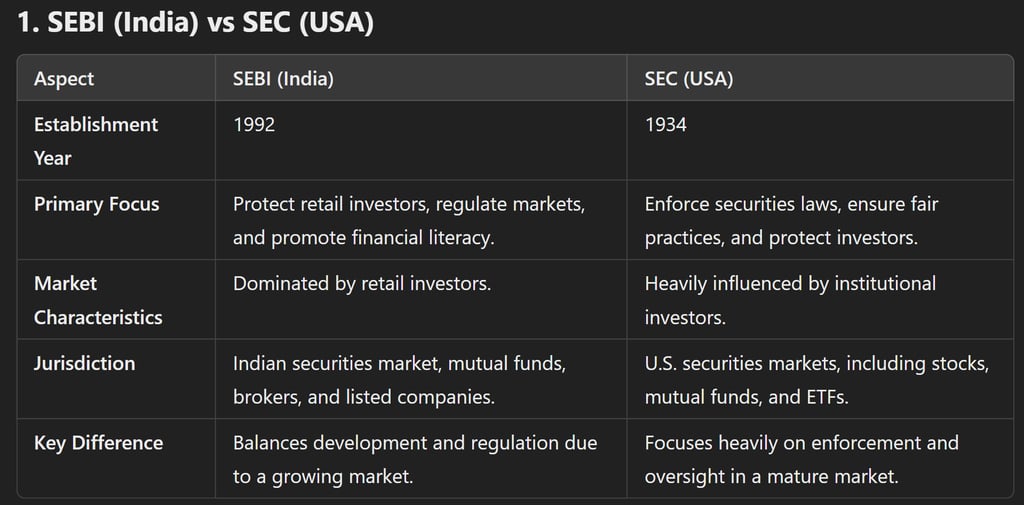

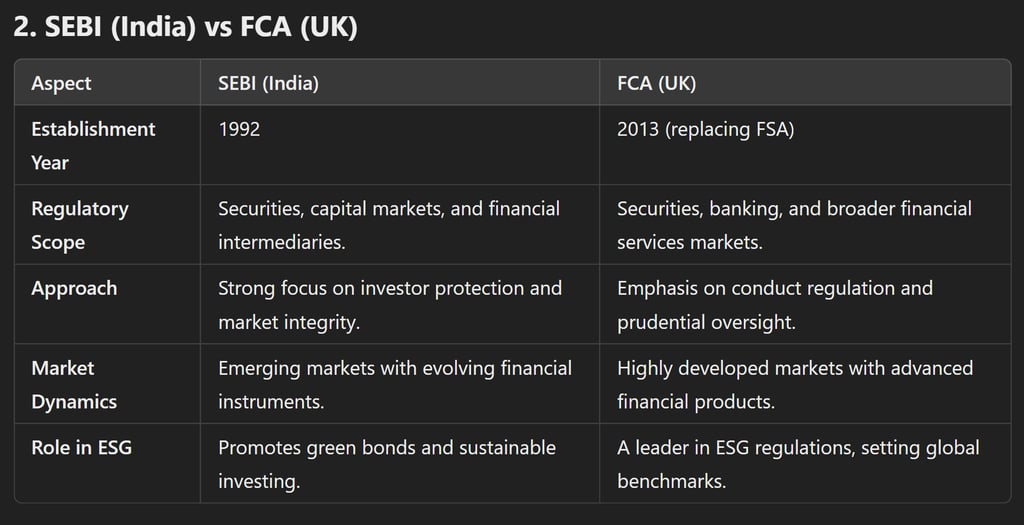

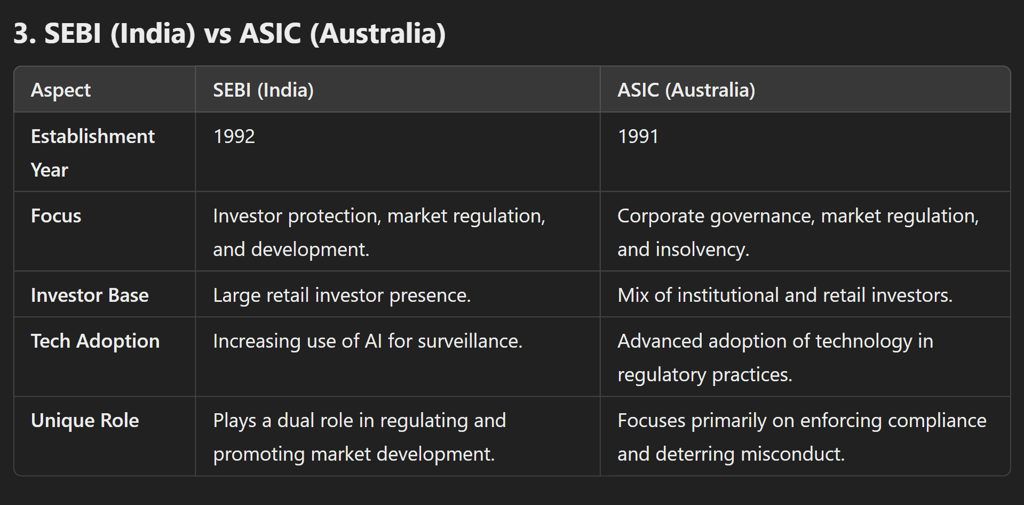

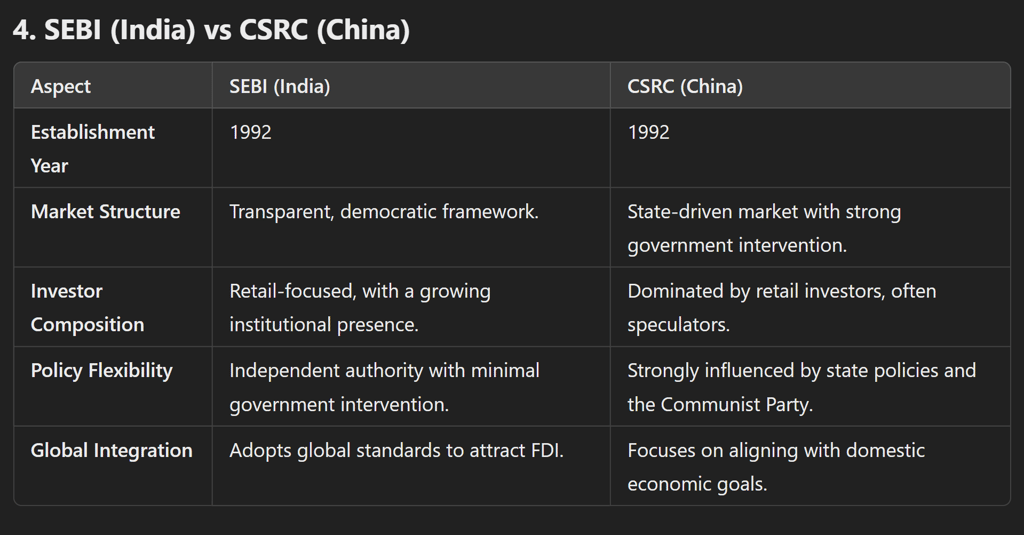

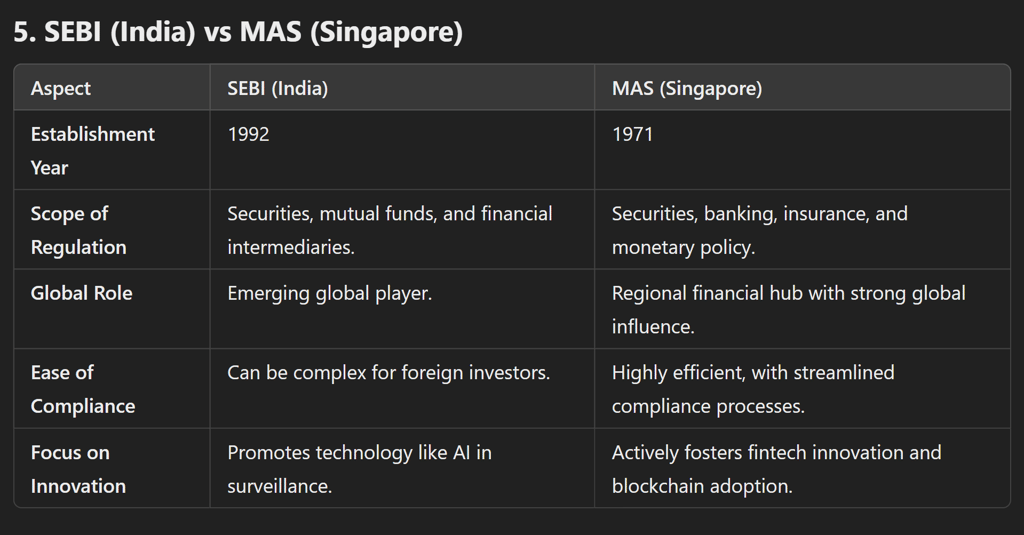

Key Takeaways
SEBI’s Unique Role: Unlike many global regulators, SEBI balances market regulation and development, critical for India’s emerging economy.
Investor Focus: SEBI prioritizes retail investor protection due to their significant presence in the Indian markets.
ESG and Sustainability: While SEBI is catching up, regulators like the FCA and SEC have already set benchmarks in ESG compliance.
Maturity Levels: SEBI governs an evolving, high-growth market, whereas SEC and FCA operate in more mature economies with advanced financial products.

SEBI is the backbone of India’s financial markets, ensuring transparency, fairness, and investor confidence. By adapting to modern challenges and fostering innovation, SEBI continues to empower investors and uphold market integrity.
For investors and stakeholders, understanding SEBI's role is crucial for making informed decisions in India’s dynamic capital markets.
Subscribe to our newsletter
All © Copyright reserved by Accessible-Learning
| Terms & Conditions
Knowledge is power. Learn with Us. 📚


